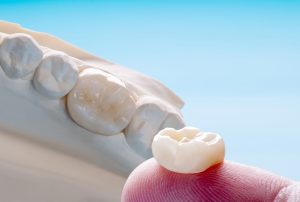Most parents assume that cavities in baby teeth aren’t a big concern since those teeth eventually fall out. However, early childhood caries (ECC) is one of the most common yet overlooked chronic diseases in young children, and its impact goes far beyond a temporary toothache. Decay in baby teeth can lead to pain, infection, difficulty eating, and even developmental delays in speech and jaw growth.
This guide will explain what early childhood caries are, the main causes of cavities in infants and toddlers, and the best prevention strategies to protect your child’s developing smile. By understanding ECC early, parents can take the right steps to prevent decay before it starts, ensuring their child’s oral health is set up for lifelong success.
What Are Early Childhood Caries?
Early Childhood Caries (ECC) is more than just a few cavities in baby teeth—it is an aggressive and rapidly progressing form of tooth decay that can develop as soon as a child’s first tooth erupts. Unlike cavities in older children or adults, ECC spreads quickly due to the thin enamel and weaker structure of baby teeth, making early intervention critical.
What many parents don’t realize is that ECC is classified as a disease, not just a condition. It often results from prolonged exposure to sugary liquids (including formula, milk, and juice) and a combination of poor oral hygiene and bacterial transmission. In fact, parents and caregivers can unknowingly pass cavity-causing bacteria to their child through sharing utensils, kissing, or even testing food temperature with their mouth.
ECC isn’t just about tooth decay—it can lead to pain, infections, difficulty chewing, and even issues with speech development if left untreated. Children with severe ECC may require extensive dental work, sometimes under general anesthesia, a risk that could have been avoided with early prevention.
Understanding the nature of ECC is the first step toward early childhood caries prevention. Parents should recognize that baby teeth are not disposable; they serve a critical role in guiding permanent teeth and supporting overall health. When decay is left unchecked, it doesn’t just affect a child’s mouth—it impacts their overall well-being, self-esteem, and even their ability to focus in school.
The Main Causes of Early Childhood Caries
Early childhood caries (ECC) can often be traced to habits and environmental factors that go unnoticed by most parents. While sugary foods and poor brushing are common suspects, other less-discussed causes contribute significantly to the development of tooth decay in young children. Here are some of the more subtle factors:
- Frequent Snacking on Sticky or Carb-Laden Foods: Children often consume small, frequent snacks throughout the day. While fruit and crackers may seem healthy, many of these foods, especially those high in refined carbohydrates, can stick to teeth and fuel decay-causing bacteria for extended periods.
- Prolonged Use of Sippy Cups or Bottles: Allowing a child to sip continuously from a bottle or sippy cup throughout the day—especially with sugary liquids—can create a “constant bath” of sugar around the teeth. This lingering exposure to sugar creates an environment where harmful bacteria can thrive and break down enamel.
- Low Saliva Flow: Saliva plays a key role in neutralizing acids and washing away food particles. Some children may have naturally lower saliva production, which can leave their teeth more vulnerable to decay. Conditions like chronic mouth breathing or certain medications can further reduce saliva flow, making oral health even more challenging.
- Genetic Predisposition to Weaker Enamel: Not all teeth are created equal. Some children may be born with enamel that is more susceptible to decay due to genetic factors. Even with excellent oral hygiene, these children may be at higher risk for early childhood caries.
- Delayed Introduction of Dental Care: Many children don’t receive their first dental checkup until after their first birthday. Delaying dental visits means missing out on early detection of risk factors, guidance on proper oral care techniques, and the opportunity to begin preventive treatments such as fluoride varnishes and sealants.
- Transmission of Harmful Bacteria from Caregivers: Many parents unknowingly pass harmful bacteria to their children by sharing utensils or cleaning pacifiers with their mouths. These bacteria can establish a foothold in the child’s mouth, leading to an increased risk of tooth decay.
Early Signs and Symptoms of Childhood Tooth Decay
While cavities may not always present immediate pain, there are subtle signs that parents can look for before the decay becomes more advanced. One early symptom of childhood tooth decay is visible changes in the tooth’s appearance, such as white or brown spots, particularly near the gum line. These spots indicate that the enamel is demineralizing, which could lead to cavities if left untreated. Another often-overlooked sign is sensitivity to hot, cold, or sweet foods, which may be dismissed as teething discomfort. However, this can suggest that the enamel is thinning or the tooth structure is compromised. Behavioral changes like reluctance to chew on one side of the mouth or increased fussiness during meals may also point to discomfort from early-stage cavities. Lastly, parents might notice bad breath that persists despite brushing, which is a common indicator of bacterial buildup due to untreated decay. These subtle signs, if caught early, can help prevent more severe dental issues.
How to Prevent Early Childhood Caries
Preventing early childhood caries goes beyond simply brushing teeth and limiting sugary snacks. One often overlooked strategy is monitoring feeding habits. For infants and toddlers, frequent and prolonged bottle-feeding, especially with milk or juice, can increase the risk of caries. The constant exposure to sugars creates an ideal environment for bacteria to thrive. Transitioning from bottles to cups and avoiding overnight bottle feeds can significantly reduce this risk. Another crucial yet under-discussed measure is strengthening the child’s saliva. Saliva plays a key role in protecting against tooth decay by neutralizing acids and washing away food particles. Encouraging healthy hydration with water, especially after meals or snacks, boosts saliva production. Additionally, considering probiotics may be beneficial in some cases. Certain probiotics can help balance the oral microbiome, reducing harmful bacteria and promoting a healthier environment in the mouth. These proactive measures, along with regular dental checkups, form the foundation of a successful preventive strategy against childhood caries.
Treatment Options for Early Childhood Caries
- Silver Diamine Fluoride (SDF): A non-invasive treatment that halts the progression of decay by applying a liquid to cavities, making it particularly useful for high-risk children who have difficulty undergoing traditional procedures. It also reduces the need for drilling.
- Hall Technique Crowns: Stainless steel crowns that are placed over decayed teeth without drilling or anesthesia, ideal for children with severe decay in primary molars. This technique is minimally invasive and effective for preserving tooth structure.
- Bioactive Fillings: Materials like resin-modified glass ionomer or bioactive composites that release fluoride and minerals to remineralize the tooth over time, providing long-lasting protection against further decay.
- Ozone Therapy: A non-invasive treatment using ozone gas to kill bacteria and stop the spread of decay. This technique is often used for very early stages of tooth decay and can be a good option for children with high dental anxiety.
- Teeth-Saver Devices: Silver ion-based materials used to halt decay progression in multi-cavity situations, especially useful for children with high risk factors like poor diet or multiple cavities.

The Importance of Pediatric Dental Care for Caries Prevention
Pediatric dental care plays a critical role in preventing early childhood caries (ECC), but its impact goes beyond just routine checkups and cleanings. One often-overlooked aspect of pediatric dental visits is the ability to identify hidden risk factors early on. For example, a child’s unique oral bacteria, family history of cavities, or even the child’s oral habits can be assessed during these visits to create a customized prevention plan.
Additionally, pediatric dentists specialize in building trust with young patients, helping to prevent the anxiety that can come with future dental visits. This comfort factor increases the likelihood of children returning for regular checkups and preventive treatments like fluoride varnishes and sealants. Pediatric dentists also educate parents on oral hygiene habits and nutrition, providing insight into factors like the timing of bottle weaning or the types of snacks that can contribute to decay. Their expertise ensures that children are not only treated for existing issues but are also equipped with the knowledge to avoid them in the future.
Final thoughts
Early childhood caries is a preventable condition, but it requires vigilance, timely intervention, and the right care. By understanding the causes, risk factors, and treatment options for ECC, parents can take proactive steps to protect their children’s oral health. Regular pediatric dental visits, along with good oral hygiene habits and nutrition, are key to preventing and managing decay.
If you’re concerned about your child’s oral health or need guidance on caries prevention, our team at Ballantyne Pediatric Dentistry is here to help. Visit us today or call 704-752-1900 to schedule an appointment and ensure your child’s smile stays healthy for years to come!

